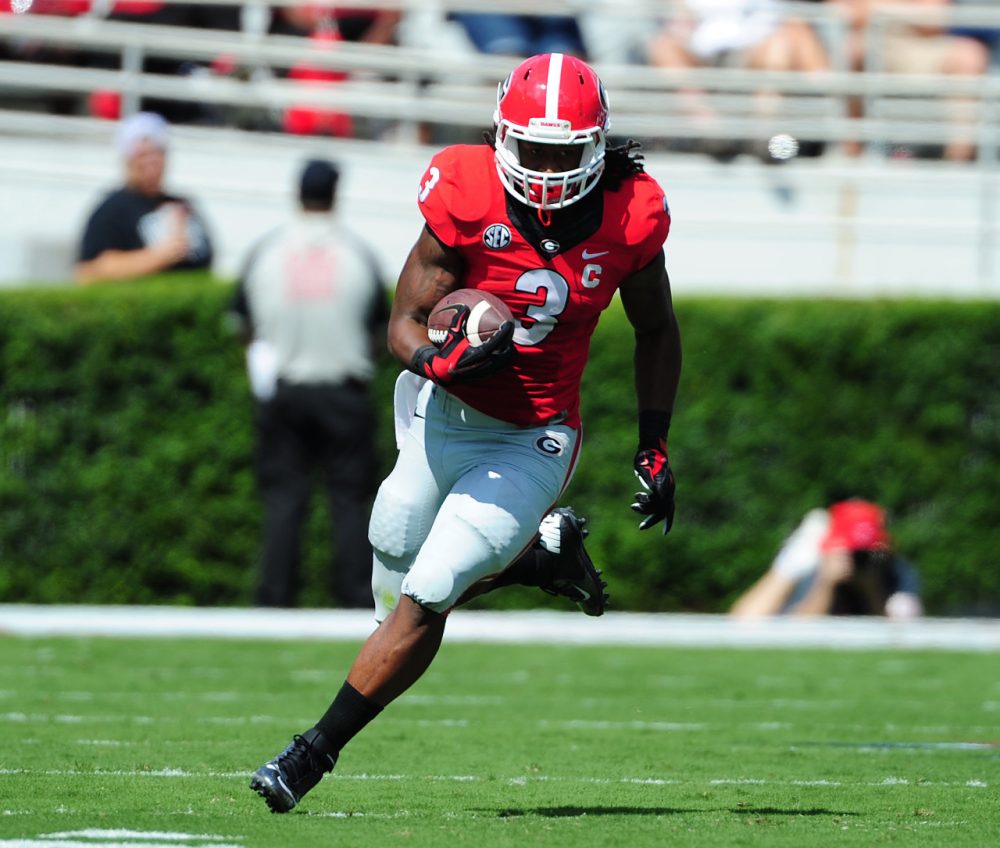Advertisement
Autographs And The NCAA's 'Own Little Universe'

Everybody loves an athlete who signs autographs for fans. But Florida State quarterback Jameis Winston and Georgia running back Todd Gurley may have been too generous with their signatures. Both are under investigation after an autograph-authentication business certified their signatures on thousands of items.
Michael Weinreb has written about the issue for Rolling Stone and he joined Bill Littlefield.
BL: I guess the problem here is that, while there's not yet proof of money changing hands, nobody signs 2,000 items just for the fun of it, right?
[sidebar title="A History Of Signature Strife" width="630" align="right"] Johnny Manziel was accused of selling his signature before his final college season. [/sidebar]
MW: Yeah, you wouldn't think so. It would be a pretty odd thing to do just for fun. And it's not the first time this has happened, obviously. We had the same issue with Johnny Manziel last year.
BL: You mention Manziel, the 2012 Heisman Trophy winner. He was caught in a similar scandal last year. But he could afford good lawyers. He was suspended for only half a game. Does the Manziel precedent make things better or worse for Winston and Gurley?
MW: Well, I think the one thing they have going for them is that public opinion is now in their favor. People at this point see how much money is being poured into college football and how much money these schools are making off the game and they see these kids who can't even profit off their own name and likeness. And I think most of the public thinks that that's completely unfair. And so, you know, if they wind up throwing the book at either of these guys for signing these autographs, public opinion of the NCAA, which is lower than public opinion of Congress at this point, is only going to get worse.
BL: You have in fact written that this particular rule, which prevents college athletes from benefiting from their likenesses and their signatures, should get a poleaxe taken to it. But fairness has never stopped the NCAA from doing what it wants to do in the past.
The NCAA lives in its own little universe, so I mean who knows what they're going to wind up doing here?
Michael Weinreb
MW: That's true. The NCAA lives in its own little universe, so I mean who knows what they're going to wind up doing here? But I think the schools are starting to recognize that public opinion is going against them. The fact that the universities are selling Georgia No. 3 jerseys on their websites just makes it seem even more hypocritical.
BL: Well the hypocrisy and the unfairness of the rule notwithstanding, it is still a rule. I have to wonder: when these fellas signed all this stuff, did they think nobody would notice when hundreds of sequentially numbered signed items appeared on the market?
MW: Yeah, you do have to wonder if they just thought that they could get away with this. Maybe there's just a sense that everybody does this. And it wasn't a whole lot of money, that's the thing. The Gurley situation, best as we know, was what, a few hundred dollars or something? So it's not like he's making huge money off of this. I guess they just assume, "Well, it's a little extra spending money. You know, I'm gonna go pro soon anyway. What's the difference? I assume other guys are doing this too."
BL: Has the discussion of this news caused more harm to the images of Winston and Gurley or more harm to the image of the NCAA?
MW: Well, the Winston situation is more complicated, obviously, because there is that sexual assault case in his background, and that's still being investigated. Gurley — I mean obviously, you know, five minutes after the Gurley news came out, the #FreeGurley hashtag on Twitter was about the biggest thing around. So I mean I think all it's going to do is help him. And you can also make the case that running backs have a short shelf life as it is, and Gurley's obviously going to be a top NFL pick, so it might help him to rest his legs for the second half of the year and just go straight to the NFL.
BL: How long do you think it will take before college athletes can profit off their signatures without violating an NCAA rule?
MW: I think it's going to happen sooner than we think. You know, the NCAA has become a very reactionary organization. They're just going to react to public opinion at this point because I don't think they're sure what else they want to do. I think we're going to get there a lot faster than we would have otherwise just because of these high-profile cases popping up, but I've said that before about the NCAA, and sometimes nothing ever changes anyway.
More College Football Coverage:
This segment aired on October 18, 2014.